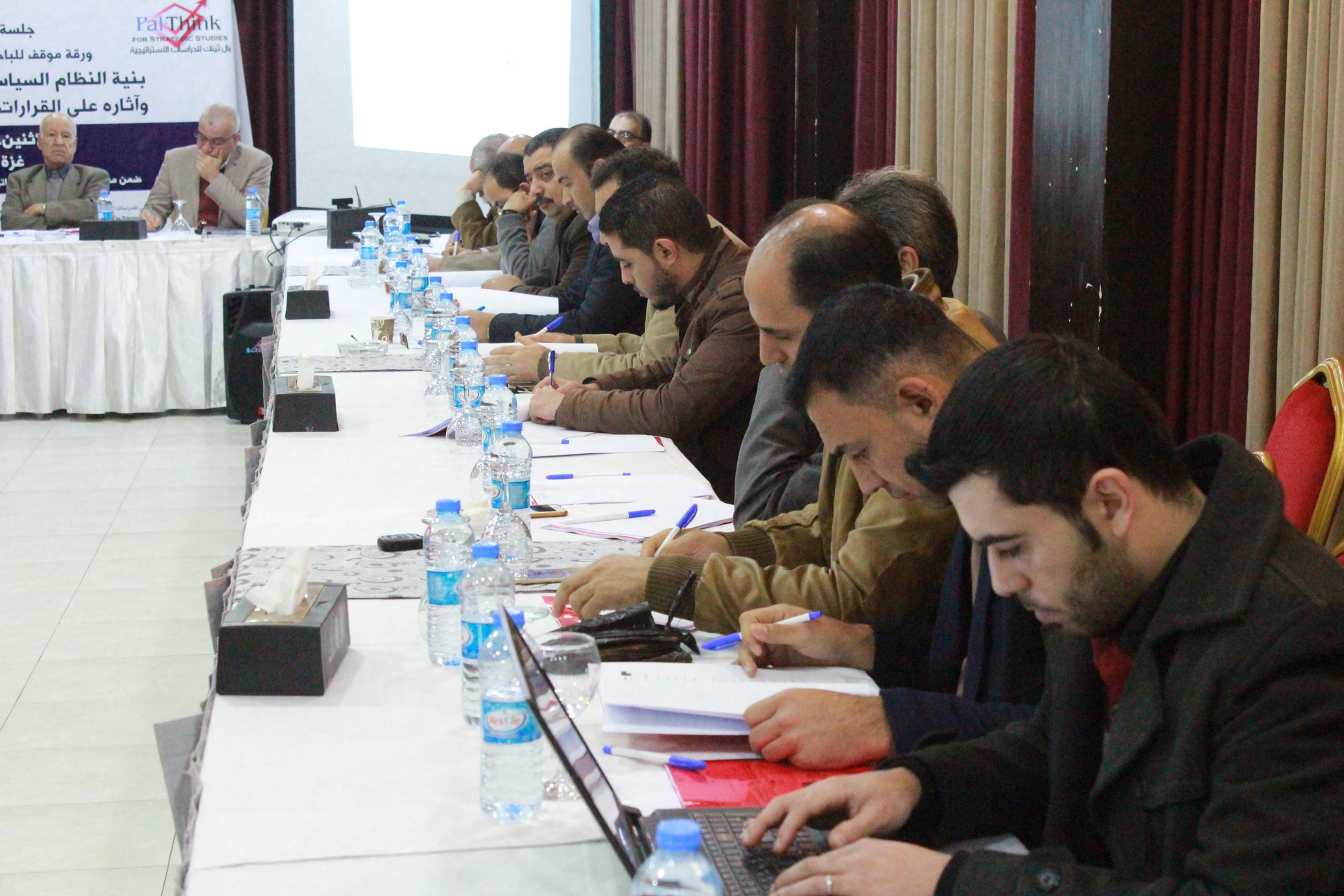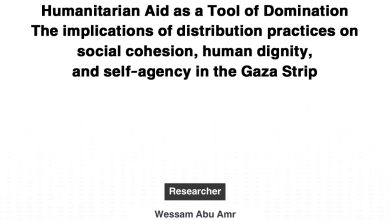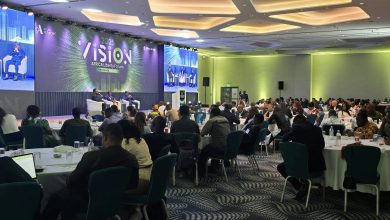The Structure of the Political and Electoral System in Israel;by the researcher, Muhannad Mustafa

Summary of roundtable discussion on the policy paper:
“The Structure of the Political and Electoral System and the Constitution of ‘Dominant Bloc System’ in Israel; its implications for the decisions on the Palestinian Issue” by the researcher, Muhannad Mustafa
Gaza, 08/1/2018
Background:
“Building Strategic Capacity: Empowering Civil, Political and Emerging Constituencies in Palestine and Israel” is an EU Peacebuilding Initiative-funded project that runs from 2017 to 2020 and develops the ongoing work of the Palestine Strategy Group (PSG), the Palestinian Citizens of Israel Group (PCIG) and the Israeli Strategic Forum (ISF). This roundtable discussion was part of the PSG dimension of the project. Since being founded in 2008, the PSG has produced a considerable number of studies and strategic reports on the Palestinian issue. In cooperation with Pal-Think for Strategic Studies, the Palestinian Center for Israeli Studies (MADAR) and Oxford Research Group, the PSG will produce 12 research papers which deal with multiple themes and perspectives that will ultimately be integrated into a strategic report entitled “Palestine 2020”. The report will be presented at a major conference in Ramallah in 2020.
The first paper to be the focus of a Gaza roundtable discussion was “The Structure of the Political and Electoral System and the Constitution of “Dominant Bloc System” in Israel; its implications for the decisions on the Palestinian Issue” which was conducted by the lecturer and researcher at the Palestinian Center for Israeli Studies “Madar”, Mr. Muhannad Mustafa.
Workshop’s Attendees:
With the cooperation of all partners, the roundtable discussion was conducted in Gaza city, in the presence of Mr. Muhannad Mustafa from Ramallah via Skype, the writer and political analyst, Hani Habeeb, prof. Tawfiq Abu Shumer, Mr. Omar Sha’aban, Head of Pal-Think for Strategic Studies, and 37 male and female distinctive writers, analysts, and specialists in Israeli Affairs in the Gaza Strip. Participants were aged between 24 and 50 years old.
Omar Sha’aban’s Contribution:
Mr. Omar Sha’aban opened the session and welcomed the attendees. He began by noting that Pal-Think, based on its mission and successive activities, tries always to focus on issues that prove that the people of the Gaza Strip possess the same special capacities, talents, innovation and creative thinking as the rest of the world. He added that this paper is further proof of the excellence that we, Palestinians typically possess; “This paper focuses on a new and vital topic which we, as Palestinian readers, need to give further focus to so that we can figure out its implications on the Palestinian issue.” Furthermore, Mr. Omar said that this meeting prepares for more research papers carried out by influential researchers that will focus on local, national, Israeli, regional and international perspectives. He concludes by highlighting that these papers will be presented in 2020 as a strategic document for the State of Palestine.
Muhannad Mustafa’s Contribution:
First, Mr. Mohannad Mustafa began his session by summarizing his paper and highlighting the most important points that he wished to draw the attendees’ attention to. He spoke about the Israeli electoral system, its influence on the Israeli government’s day-to-day workigns as well as the particular impact it has on the Palestinian issue. He broadly referred to the dominant bloc as a new stage in the Israeli electoral system that has crystallized in the last decade. He added that the dominant party bloc system implies that the right-wing bloc is the only power capable of forming a government and necessitates right-wing parties to do so; the so-called opposition cannot form a government without their help. “The crystallization of this system contributed to a shift in power for the right-wing party. They went from being a party in control to a party that dominates the Israeli political system.” he continued. He showed how this is leading towards the adoption of most right-wing arguments on the Palestinian issue, denying the reality created by the Oslo Agreement, and the resolution of the Palestinian issue based on its ideological perceptions.
Tawfeek Shumer’s Contribution:
Reflecting on this paper, Prof. Tawfeek Shumer, a specialist in the Israeli affairs, said: “It is necessary to answer whether this shift regarding the dominant bloc is a random matter or an organized Israeli policy.” He spelled out that Israel was founded on religious grounds; after that, they politicized religion. However, they recently have returned to integrating politics with religion; that is a part of Israel’s extreme strategic plan. Mr. Tawfeek expected that the dominant bloc will be intensified and racist laws will be enacted. This may lead to a government of a national unity (with a different formula to that of the dominant bloc).
Hani Habeeb’s Contribution:
In his comments, Mr. Hani Habeeb, a political analyst and a writer, praised Pal-Think’s role in giving participants the opportunity to discuss and reflect upon qualitative topics. Moreover, he thanked Mr. Mohannad for choosing such a deep topic to study and analyze. He stated: “As a follower of Israeli affairs, I saw that the political system was heading towards the dominant bloc; it has already been realized.” He noted that the paper was supposed to discuss the nature of transformation of elites in Israeli society, especially in the context of the development of populist culture which turned from dependence on Ashkenazi workers to a religious and eastern settler elite. It was this which led to the arrival of the dominant bloc. He illustrated that the party of the right seeks to take over the keys of state institutions, especially the judiciary and the media. He also showed that this bloc stresses the Jewishness of the state which they justify as a democratic matter.
The Attendees’ Contribution:
Consequently, the attendees started to intervene and reflect on this session. They expressed the worthiness of this research paper which deepens the study of the Israeli political system and its orientation towards the right and hegemony. They unanimously contended that Israeli society, since its establishment, was developing towards a mindset of the right. Most of them stressed the need to examine the factors that led to the extremism of Israeli society. Their rich and insightful thoughts reflect their deep and distinctive way of thinking as well as their high awareness. Many of them expected that the presence of this dominant bloc in Israel will affect Palestine very badly; Israel has a unified attitude against the Palestinians. Even worse, hatred and infliction of pain on Palestinians will be a national and Jewish duty. They thanked all partners for such meetings and asked for discussing more unique research papers on the Palestinian issue.
Conclusion:
We believe that exposure to such discussions and reading valuable papers on the Israeli and Palestinian issue will enrich participants’ mindsets and reinforce their awareness to interpret fully the surroundings and even arouse their voices. They may be heard, one day. Finally, Mr. Omar praised all of the attendees for their attention and active participation. He concluded by saying that Palestinians need to empower themselves by reading, topic familiarization, and debating in a civilized way in order to create a decent future for themselves and the coming generations.
“This document has been produced with the financial assistance of the European Union. The contents of this document are the sole responsibility of Pal-Think for Strategic Studies and the Palestine Strategy Group and can under no circumstances be regarded as reflecting the position of the European Union.”





